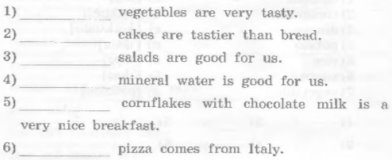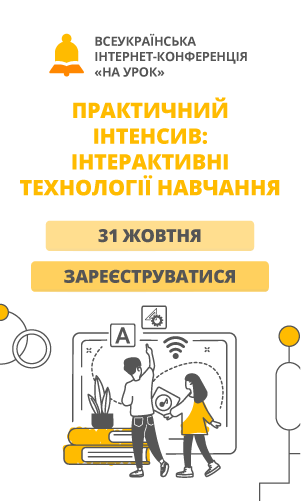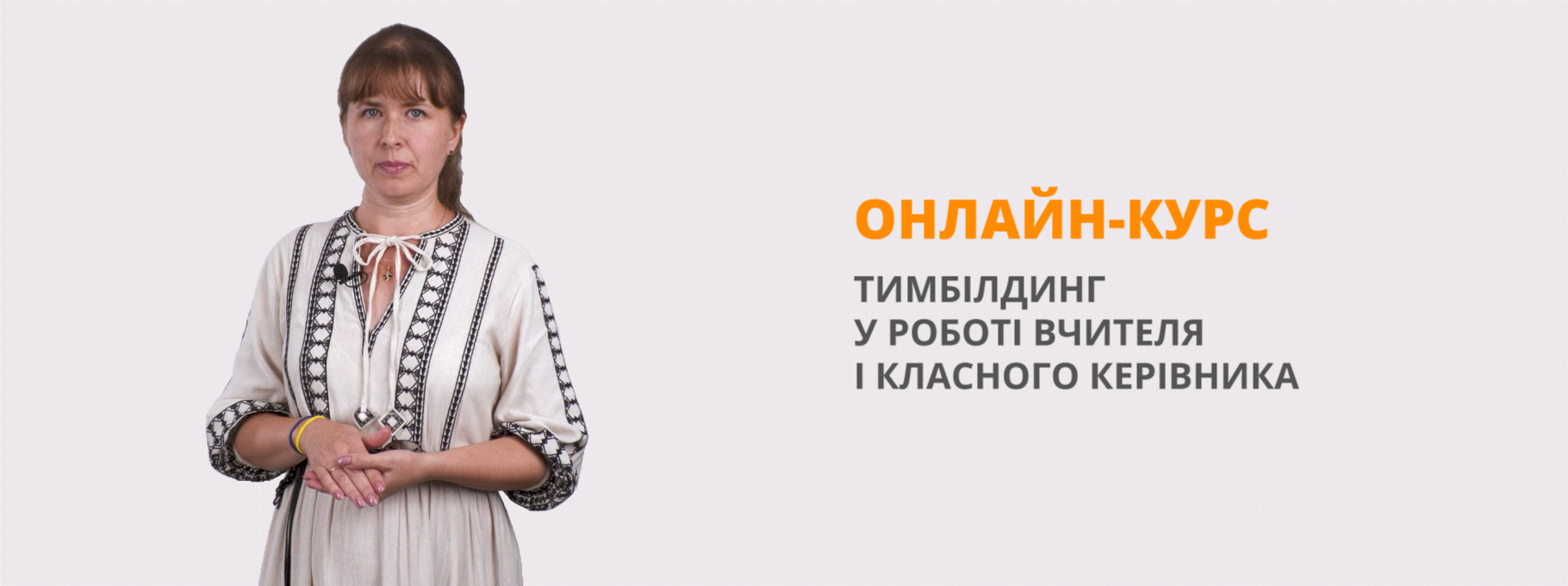Відкритий урок на тему "Їжа" у 7 класі
Узагальнюючий урок по темі "Їжа" у 7 класі містить різні види вправ з усіх видів мовленнєвої діяльності. Робота на уроці передбачається індивідуальна, парна та групова.
7 th form
Тема: "Food"
Мета
практична: 1) узагальнити та систематизувати знання по темі Food ;
2) вдосконалювати лексичні та граматичні навички,
3) вдосконалювати навички аудіювання, читання, письма й усного мовлення;
розвиваюча: розвивати логічне мислення, мовну здогадку, мотивацію до вивчення англійської мови;
виховна: виховувати відповідальне ставлення до своїх обов’язків, до їжі; виховувати уявлення про здорове харчування.
Обладнання: підручник, робочий зошит, картки для роботи в групах і в парах, ноутбук, проектор, презентація,відео.
Хід уроку
- Підготовка до сприйняття іншомовного мовлення.
- Привітання
T: Good morning, dear girls and boys! I am glad to see you! Sit down, please. How are you?
Pupils: We are fine, thank you. And how are you?
2. Повідомлення теми та мети уроку.
T: Today we shall have a lesson according to our topic “Food and health” and we shall speak about tasty, healthy and useless food. We are going to revise all the materials: cooking equipment, healthy and unhealthy food, table manners. We shall discuss different recipes. So, we are going to spend good time together. And now let’s start our work.
- Phonetic drill. T: First of all we’ll repeat how some words from our topic are pronounced.
[i: ] sweets, tea , meat, cheese
[ai] pie , ice-cream, like, rice
[æ] a pple, sandwich, salad, have
[ei] cake, bacon, cornflakes, table
[p] supper, potato, apple, porridge
2. Warm up
T: Answer my questions, children:
- What do you like to eat?
- What do you usually eat for breakfast?
- What do you like to drink for breakfast?
Now we ‘ll have some snack. Do you like apples? Each of you take an apple and answer the question written on it. Let’s learn more about each other!
3.Proverbs about food.
T: Good job. There are many proverbs about food.
- Match the beginning and the end of some of them.
Tastes comes with eating.
An apple won’t spoil the porridge.
The appetite differ.
Too much butter a day keeps the doctor away.
- Read the proverbs and match them with their equivalents.
Tastes differ.
An apple a day keeps the doctor away.
The appetite comes with eating.
Too much butter won’t spoil the porridge.
Аппетит приходит во время еды.
Кашу маслом не испортишь.
О вкусах не спорят.
Кто по яблоку в день съедает, у того доктор не бывает.
- Основна частина уроку.
- Vocabulary revision.
-
 Group Work. T: Now we are going to begin our travelling to the land of food. We’ll stop at different stations and our first station is “Vocabulary Revision”. Your task is to choose the words from the box according to your lists:
Group Work. T: Now we are going to begin our travelling to the land of food. We’ll stop at different stations and our first station is “Vocabulary Revision”. Your task is to choose the words from the box according to your lists:
The 1st group should make a list of fruit and vegetables .
The 2nd group – unhealthy food
The 3rd group – healthy food.
The 4th group – cooking utensils.
Учням роздати групи слів, вони вибирають ті, які підходять до їх категорії, по черзі виходячи до дошки і доповнюють змістовий ряд.
- Pair Work. Anagrams.
Teacher: Now, let’s work in pairs. On your desks you have different words. Put the letters in the words in the right order and then read them to your classmates.
Nabaan, Sfhi, Geg, Limk, Adsla, Ccikenh, Upos, Ragus, Zazip, Crmea, Etwes, Eat.
( banana, fish, egg, milk, salad, chicken, soup, sugar, pizza, cream, sweet, tea)
3. Find the odd word
1) breakfast, lunch, food, dinner
2) cucumber, tomato, potato, salad
3) bacon, bread, porridge, butter
4) tea, ham, coffee, juice
5) can, cup, spoon, tin, bottle
6) sausage, fish, bacon, chicken, pork
7) orange, pineapple, cherry, strawberry, potato
8) cucumber, tomato, grapes, onion, red pepper
9) raw, frozen, fast, tinned
10) sugar, milk, butter, cheese, curds
(Food, salad, porridge, ham, spoon, fish, potato, grapes, fast, sugar)
Individual cards for pupils:
- Match the words with their translation:
- Bake a) смажити на решітці
- Boil b) додавати
- Chop c) різати тонкими скибочками
- Cut d) пекти
- Fry e) різати
- Grill f) нарізати дрібно
- Peel g) одержувати
- Get h) чистити
- Slice i) смажити
- Add j) кип’ятити
- Multiple Choice. Choose the right word:
1) Cucumbers are ____________ .
a) tasty b) green c) yellow
2) In the evening we have _ in our kitchen.
a) lunch b) dinner c) breakfast
3 ) I like my porridge ____________ sugar.
a) in b) with c) at
4) What`s __________ breakfast?
a) for b) on c) at
5) Is any chicken in the fridge? I think __ .
a) so b) is c) not
6) Bananas are the_____ of all fruit .
a) tastiest b) tastier c) tasty
7) I`d like tomato and cucumber _ , please.
a) porridge b) ice-cream c) salad
8) I am ______ my breakfast now .
a) enjoy b) enjoyed c) enjoying
(green, dinner, with, for, so, tastiest, salad, enjoying)
5. Make the sentences:
1. eat, for breakfast, porridge, I
2. She, milk, for lunch, drink, does not
3. For supper, would, I, orange, like, juice
6. Healthy and unhealthy food. Write down healthy and unhealthy food.
|
Healthy food |
Unhealthy food |
|
|
|
|
|
|
- Write the recipe of sandwiches. Use this one as an example:
Take a slice of bread.
Put some butter on the bread.
Add some ham.
Put another slice of bread.
Help yourself!
2. Grammar.
T: Well, we’ve revised some words and now let’s work with nouns. There are two types of nouns countable and uncountable. The countable nouns are nouns that we can count. The uncountable nouns are the nouns that we can’t count. Look at the slides, read the words and decide if they are countable or uncountable.
- Учитель показує на слайдах слова і пропонує учням визначити, які з них можна порахувати, а які ні: cherry, banana, chocolate, sugar, milk, cake…
- T: Remember that in English language we use some, any and no with uncountable nouns. Some is used in positive sentences. Any is used in negative and interrogative sentences. Учні отримують картки з завданнями.
- Complete the sentences with some or any:
- Have you got_____ brothers or sisters?
- We don't need_____ olive oil.
- Here are_____ letters for you.
- I need_____ money.
- Is there_____ petrol in the car?
- T: Do you remember when we use much and many? So, complete the sentences with much or many:
- Have you got_____ homework?
- We don't need_____ eggs. Just half a dozen.
- Is there_____ traffic in your town?
- I don't know_____ students in this class.
- How_____ people live in your house?
3.Speaking.
a) Group Work.
T: Let’s move to different groups. Choose a picture and go to your group. T: Now let’s speak about food. Tell me, please, what people usually eat:
- for breakfast,( Breakfast usually consists of porridge with milk and salt or sugar, eggs – boiled or friyed, bread and butter with marmalade or jam. Some people like to drink tea, but others prefer coffee.)
- for lunch,( This meal starts with soup or fruit juice. Then follows some meat or potatoes – boiled or fried, carrots and beans. Then a pudding comes. People drinkll coffee, tea or water).
- for dinner (Dinner usually consists of soup, fish or meat with vegetables – potatoes, green beans, carrot and cabbage, sweet pudding, fruit salad, ice-cream or cheese and biscuits. )?
b) Pair work.
T: Well done! The next task will be speaking about your favourite food and drinks. Make short dialogues with your Partners on the right and Partners on the left.
- Dialogues with your Partners on the right:
- What is your favourite food?
- My favourite food is...(meat, sweets...)
- Dialogues with your Partners on the left.
- What do you like to drink?
- I like to drink ...(milk, juice...)
- Complete the sentences with I think / I don`t think:

4. Reading
1) Pre-reading.
a) Повторення лексичних одиниць з теми.
T: First look at these pictures and name the things you can see there.
P: Pizza, Coca-Cola, hamburger, cheeseburger, sandwich, French fries, candies, cookies, soda water, potato chips etc.
T: How do we call this kind of food?
P: It’s fast food / junk food.
b)Answer the questions:
- What food do you prefer to eat?
- What food is healthy?
- Why should we eat healthy food?
- What food do vegetarians eat?
- What are you allowed to eat?
2.Reading. Pupils read the text one by one.
T: Read the text and decide if the sentences are true or false:
Fast Food is very bad for your health.
A lot of people eat fast food almost every day because they find it very tasty. Sometimes they eat it because they are busy and don't have time, or are too tired to cook.
Firstly, fast food such as burgers and chips contain a lot of fat and salt. People shouldn't eat fast food very often as this is bad for their health. We need to eat a plenty of fresh fruit and vegetables as well as fish and meat.
Secondly, fast food is very expensive. The money some people spend on fast food in one week is enough to buy fresh food for two weeks.
On the other hand, some people say that eating fast food saves time. They can cook during the weekend so that they have enough food for the whole week and so it's a way busy people can avoid cooking during the working week.
Although fast food is usually tasty and convenient, people should try to prepare their own meals and eat meat which is full of protein and other healthy products, all these items of food will make their lives long and healthy.
- Post-Reading Activity.
a) True or False:
1.A small number of people eat fast food every day.
2.Fast food is full of vitamins.
3.It is not harmful for our health.
4.Fast food is rather cheap.
5.Burger and chips are full of protein.
b) Finish the sentences:
1. Sometimes people eat it because they are…
2. People shouldn’t eat…
3. Fast food is very …
4. They can cook …
5. Fast food is usually tasty and …
- Choose the right ending of the sentence:
- Every year people in the world are becoming…….
- happier
- fatter
- healthier
- Finger food is fast food which can be eaten …
- without forks
- without sticks
- without forks and knives
- Fast food is usually served in…….
- cartons, bags or plastic wrappings
- plates
- cans and cartons
- People are overweight because they eat fast food …..
- at home
- in a restaurant
- in a hurry
- Eating of junk food can lead to …..
- problems at work
- health problems
- dental problems
- To be healthy a person needs …..
- to have a lot of money
- minerals, proteins, vitamins
- to have enough sleep
(1b, 2c, 3a, 4c, 5b, 6b)
- T: Let’s sum up what we’ve got.
Fast food and junk food is…..
This kind of food is high in……. and low in ……..
It can lead to…….
5. Relaxation.
T: Let’s relax! Stand up! Your task is : if you hear the word which means FOOD you should sit down. If you hear the word which means KITCHEN EQUIPMENT you should jump up. If the word doesn’t belong to the topic FOOD, you it down. So, are you ready? Let’s begin:
Frying pan, meat, cheese, hand mixer, a grill, kitchen chair, fridge, tomatoes, a pot, toaster, sausage, bread, butter, sandwich, cutting board, an oven, chicken, proteins, ice-maker, a bottle opener, juice, fast food, sweets
6. Listening.
- Pre-listening stage – зняття лексичних труднощів.
T: We are going to listen to the text about children’s favourite food. Firstly, let’s look what words might be unknown to you:
to make somebody sleepy - заганяти в сон
to recommend - рекомендувати
a pancake - блинець
delicious - дуже смачний
scrambled eggs - омлет
sunny side-up egg – яєчня-глазунья
a blueberry muffin - чорничний маффін
- Listening stage – “What do you like to eat for breakfast?” T: Now listen to the dialogue and complete it with the words.
T: Tell me, please, what dish the boy ordered?
1. What do you like to eat for breakfast?
2. I like a large breakfast.
1. I like a large lunch.
2. A large lunch makes me sleepy.
1. Anyway, what do you recommend for breakfast?
2. Hmm. The pancakes are good.
1. Pancakes. Delicious. What else?
2. Amm, do you like eggs?
1. Yes, I like eggs.
2. Oh. You could have some scrambled eggs with toast.
1. Or a sunny side-up egg? Yummy!
2. Or sunny side-up. Right? Or omelet?
1. Omelet? I love omelet. Cheese omelet, ham omelet, vegetables omelet.
2. Uhm. Mixed fruit. Mixed fruit with yogurt makes a good breakfast.
1. That’s right. And fruit has many vitamins, too. What else?
2. What else? You can have a cup of coffee and a blueberry muffin.
1. Mmm. Muffin and a cup of coffee. Sound great?
2. So, do you know what you want to get?
1. yes, I do. And thank you for your recommendations.
2. You’re welcome. So, what will you get?
1. A hamburger.
2. A hamburger?
1. Yes, and ice-cream.
4) Post-listening stage – перевірка розуміння тексту.
T: What was this dialogue about? Make up your own dialogues using this one as an example.
7. Writing.
- T: And now we‘ll see how you can cook. You will write the recipes of famous dishes. Make up word-combinations from the given words to revise the vocabulary.
|
Bake |
chicken |
|
Boil |
turkey |
|
Chop |
fish |
|
Cut |
banana |
|
Fry |
onion |
|
Grill |
potato |
|
Peel |
meat |
|
Roast |
lemon |
|
Slice |
carrot |
|
Squeeze |
cake |
- Read the recipe. Fill in the gaps with the words from the box. Guess what recipe it is. (mashed potato)
(add, boil, cut, get, mash, peel, put, take, wash, add)
1.____3or 4 potatoes.
2.____them.
3. Then____them carefully.
4.If the potatoes are very big,____them into smaller pieces. 5.Then____them into cold water,____some salt and____till they are ready.
6.____ the water out and ____some milk and butter.
7.Wait till the milk starts boiling._____everything carefully.
- And now I have a special task for you.
- In your groups write the recipe of Soup, Vegetable Salad, Fruit Salad and Apple Pie.
T: Pupils, read your recipes and put your projects on our table. (На дошці макет святкового столу)
Look and say what is absent on our table? It is a cake. Here it is. And now let’s decorate our cake. If you know and if you can now make up a recipe, decorate the cake with fruits. If you don’t know and you can’t make up a recipe, decorate the cake with vegetables. (the pictures are on the desks)
8. Table Manners.
T: Now that we have our table with some dishes let’s say what you should do while eating and what you shouldn’t do:
- Wash your hands before eating
- Use polite words, such as: Excuse me, Thank you, May I.
- Take your cap/hat off at the dinner table
- You have to eat with a knife and a fork.
- Place napkin on your lap
- Talk when you have food in your mouth
- Chew with your mouth closed always
- Eat with your fingers
- Play with your food
- Speak rude about your food
- Заключна частина уроку
- Підведення підсумків уроку.
Well, it’s time to finish our lesson. Children, did you like the lesson? What did you like most of all? You’ve worked hard today! I liked your answers, the way you have worked. Your marks for today are…
Thank you for the lesson.
Now open your dairies and I and write down your home work for tomorrow
- Домашнє завдання
Повторити лексичний та граматичний матеріал теми
1


про публікацію авторської розробки
Додати розробку
